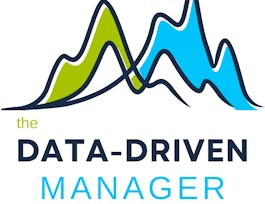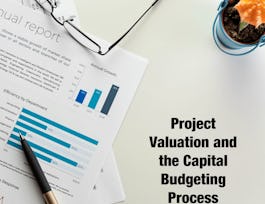Engineering and Business professionals often have access to many sources of data. The best way to way to ensure your data is both valid and reliable is to plan for it ahead of time. Through this class, you will be able to plan for accurate and precise data generation, then use that data for the purpose of estimation and risk reduction related to capital investments.



Data Acquisition, Risk, and Estimation
This course is part of The Data Driven Manager Specialization

Instructor: Wendy Martin
Sponsored by Coursera Learning Team
Recommended experience
What you'll learn
Create a plan to answer business and engineering questions.
Calculate effect size, power and sample size to reduce risk in decision making.
Distinguish between best- and worst-case scenarios given point and interval estimates.
Details to know

Add to your LinkedIn profile
7 assignments
See how employees at top companies are mastering in-demand skills

Build your subject-matter expertise
- Learn new concepts from industry experts
- Gain a foundational understanding of a subject or tool
- Develop job-relevant skills with hands-on projects
- Earn a shareable career certificate


Earn a career certificate
Add this credential to your LinkedIn profile, resume, or CV
Share it on social media and in your performance review

There are 5 modules in this course
Upon completion of this module, students will be able to classify types of sampling used for data acquisition, describe sampling error, and construct random number sequences for sampling.
What's included
12 videos1 reading1 assignment2 discussion prompts
Upon completion of this module, students will be able to calculate point and interval estimates using RStudio and ROIStat.
What's included
9 videos1 assignment1 discussion prompt
Upon completion of this module, students will be able to use point and interval estimates to determine best- and worst-case scenarios.
What's included
9 videos2 assignments1 discussion prompt
Upon completion of this module, students will be able to plan for data acquisition to minimize risk in decision making, including sample size, effect size and power calculations.
What's included
12 videos1 assignment1 discussion prompt
Upon completion of this module, students will be able to use return on investment calculations to determine effect size, sample size and power using RStudio and ROIStat.
What's included
11 videos2 assignments1 discussion prompt
Instructor

Offered by
Why people choose Coursera for their career




Recommended if you're interested in Data Science

University of Colorado Boulder

University of Colorado Boulder

University of Colorado Boulder

Open new doors with Coursera Plus
Unlimited access to 10,000+ world-class courses, hands-on projects, and job-ready certificate programs - all included in your subscription
Advance your career with an online degree
Earn a degree from world-class universities - 100% online
Join over 3,400 global companies that choose Coursera for Business
Upskill your employees to excel in the digital economy



